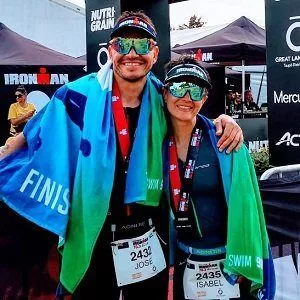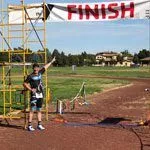How to Modify Your Training Right Now
by David Warden
As cancelled and postponed events continue to pile up due to the COVID-19 crisis, you're likely reassessing your current training plan. Once you've processed the inevitable deep disappointment for the lost opportunity, it's time to recommit, adjust, and move forward. Here is what you can do right now to modify your training plan.
First, here's what not do to: don't continue to train at the same heavy volume for an alternate event months away. Many athletes' 2020 events were or will be cancelled or postponed just at the peak of their plan's training volume. The temptation is to carry on with that heavy load until the new event, based on a fear of losing hard-earned fitness. Fitness, however, cannot be maintained forever. Empirical best-practice proves that long-term endurance performance is best maintained through a pattern of stress and rest, both at a micro (days) and macro (weeks) level where a temporary loss in fitness is accepted. That doesn't mean you can't train 12 months a year, but it does mean you shouldn't train at near-maximum volume for most of the year. Formal, heavy training for more than 6 months at a time will lead to some level of over-training and lost potential.
So, what should you do? Let's break up your options into three common scenarios.
Three common scenarios
Your event has been rescheduled or you have scheduled another future event.
First, consider completing your event anyway on the original scheduled date. How, you ask? By taking advantage of a virtual race, or just completing the distance on your own. This solution has several advantages. You can continue to train as scheduled, gain the fitness and experience from completing the event, and realize the mental benefits of completing your original goal. For runners, this is a relatively easy solution. For triathletes, where swimming options are still limited, consider completing just the bike and run portion of your virtual race.
Additionally, triathletes not only face the challenge of where to swim for their virtual race, they may also face the challenge of where to swim until their virtual race. We've created a dryland swim workout to supplement your swim training when you can't get in the water.
If a virtual race is not for you, then use the following guidelines to determine your next steps. If the replacement event is within a 6-month window from the time you began your formal training for the original event, then you're in luck. Reapply your plan with the new event's end date and start training at the point remaining in the plan.
However, it's more likely that your new event date will take place beyond the 6-month window from the date your original formal training began. In this case, it's time to take a deep breath, and invest in a period of recovery. Take at least two weeks "off" of formal training. This means no more than 4 hours a week of total exercise, and no more than 2 hours a week of running. Taking two weeks completely off is absolutely acceptable. Then, reapply your plan with the new event date, confident you are fresh and not at risk for over-training.
Your event has been cancelled and you have no alternate event available or planned.
The virtual race solution described above applies here too. But, if you're not interested in racing alone, here's how to move forward.
Until you have clarity on when your next event is going to take place, it's best to move to a Maintenance plan. They are low volume, high intensity, and right now, free. These plans are designed to bridge the gap for up to 3 months until you begin your next formal training plan.
Once you have your next event confirmed, take the same two weeks off from the Maintenance plan recommended in the first scenario, then load your plan with the new end date and jump in at that point for the time you have left. The Maintenance plan is designed to be a springboard to any distance.
Your event has not been rescheduled or cancelled (yet).
In many ways, this is the worst-case scenario. Not knowing if your event is on or off is a painful position to be in. Should you continue to train assuming the race will take place, or cut your losses now and schedule something else later in the year?
If the thought of a virtual race is appealing to you, then carry on! You have complete control of your own destiny. If not, the calculus of whether to continue can only be answered by you, and the risk of an event being cancelled seems to change daily. Regardless, you'll either inevitably find yourself in either one of the first two scenarios above and can act accordingly, or your event will continue as planned!
Don't forget the 80/20 Endurance Forums
The scenarios above can't cover all athlete situations perfectly. So, we're here for you. Feel free to post your situation in our forums and we or members of our community will help you out.












































































